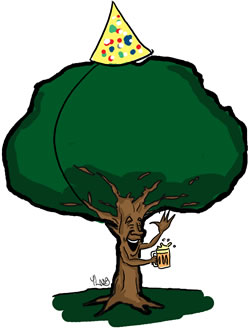In trying to comprehend my daily davening, I have become fond of the English translation available in my Artscroll. Following brachos, there are is a "Yihee Ratzon," originally recited by Rabbi Yehudah HaNassi, as "prayer for protection in day-to-day dealings with one's fellow men." One of the requests are for distance from an "evil friend."
I once attended a sheva brachos where Rabbi Yaakov Reisman spole. In the first mishna in Rosh Hashana, it lists the four "New Years"; the "New Year" for the trees is listed.
Now, he asks, what is it about trees that they merit their own celebration? C'mon, it's a tree.
 |
| Via chabad.org |
Because the tree New Year is mentioned at the same time as the other New Years, it gets a party on that merit alone. Therefore, he concluded, it is the company you keep.
I thought of this when reading "Friends Can Be Dangerous" by Laurence Steinberg. According to new studies, just the presence of other peers can make teenagers behave recklessly. Not, as was previously believed, the presence of the "bad friend"; just having other fellow teenagers around bring out the worst in teenagers.
This sort of behavior continues even unto college age students; when alone, they make the responsible choice with long-term benefits. When other college students are there, they have an adolescent's knee-jerk, all-about-now reaction.
Humans outgrow this proclivity with adulthood, thank goodness. But if simply having other people around can bring out the stupid in a teenager, what damage does an actively bad friend do to an adult?
I don't think we always honest about the state of our friendships. In teenage-hood, I made a friendship or two that, well, did not make me feel too good. I somehow managed to casually fade them out; it was almost as if I sensed the . . . corruption, if you will, on a physical level.
I think we are also often fooled by outside appearances. The "bad friend" is, obviously, someone who looks different, sounds different, dresses different. But the "bad friend" is usually who looks the same, sounds the same, dresses the same. But in the end, his off-handedness about religion and feinkeit leave a mark.
Be aware. If you come home from hanging out with a pal and feel a burning need to take a shower . . .
2 comments:
Rabbi Reisman's idea is a nice drash, but I don't understand his question. Tu BeShevat is a new year for trees inasmuch as it's the start of the fiscal year for tree produce (bikkurim etc.). If it wasn't there, farmers wouldn't know how to tithe, decide what the first fruit was and so forth. Everything else (kabbalistic sederim, Zionist celebration of the land, ecological activities) came later. Or am I missing something?
Also, what is 'feinkeit', if you don't mind me asking? My Yiddish is virtually non-existent, and I'm trying to get in the habit of swallowing my pride and asking questions rather than bluffing.
Rabbi Reisman was taking poetic license for a sheva brachos speech. It was a nice point, but it's not like I'm paskening off of it.
"Feinkeit" simply means "refinement." Sounds close enough. ;)
Post a Comment